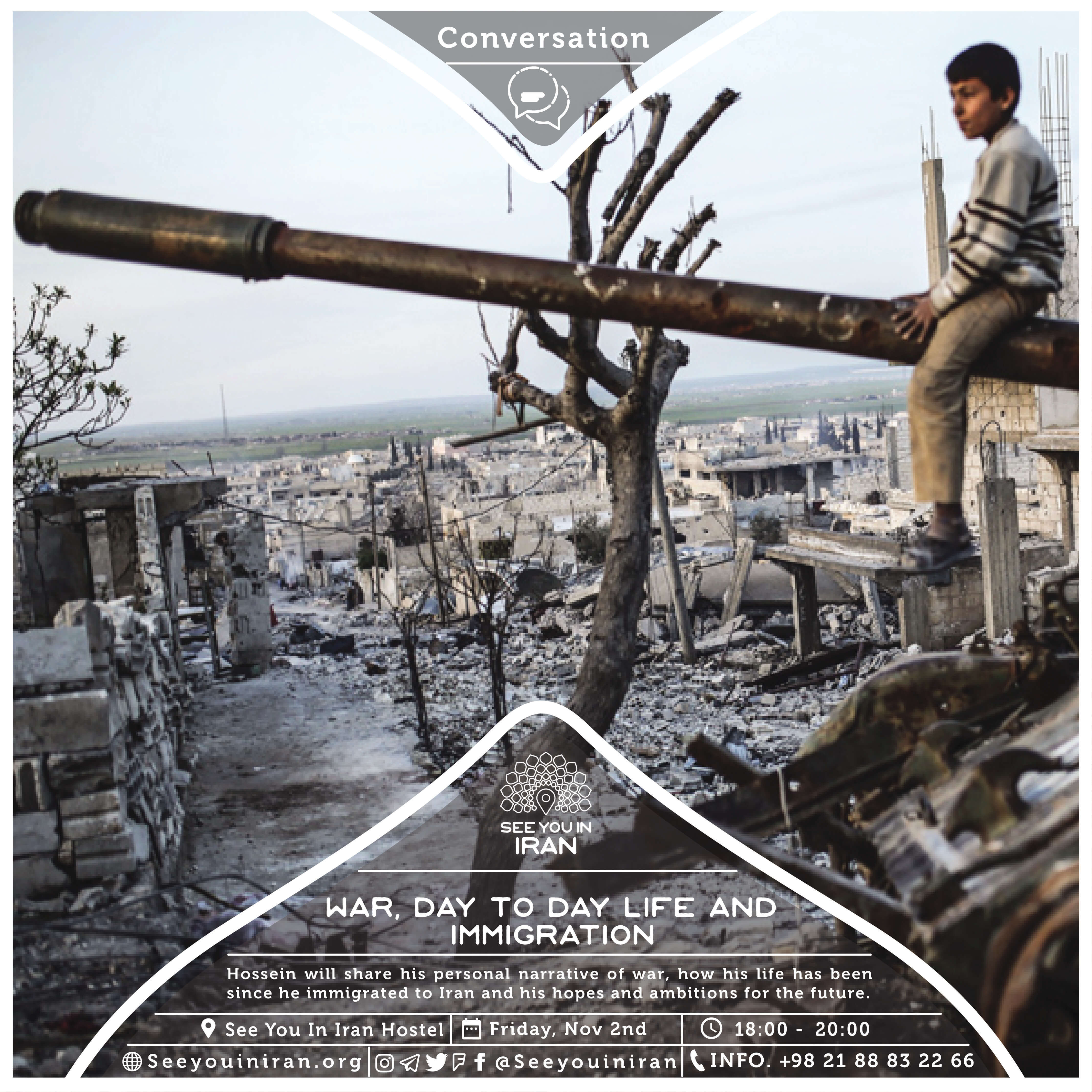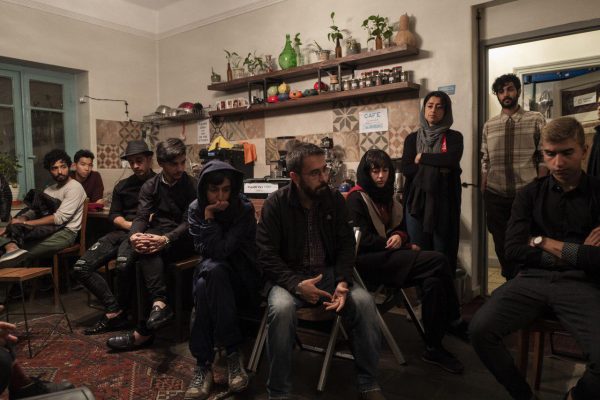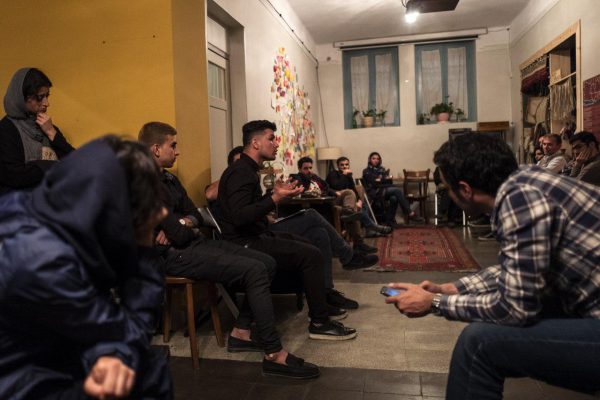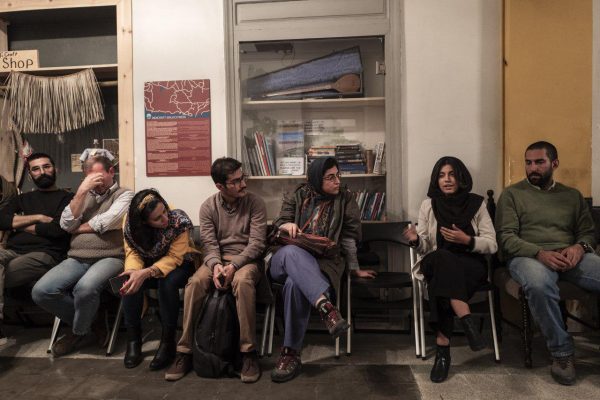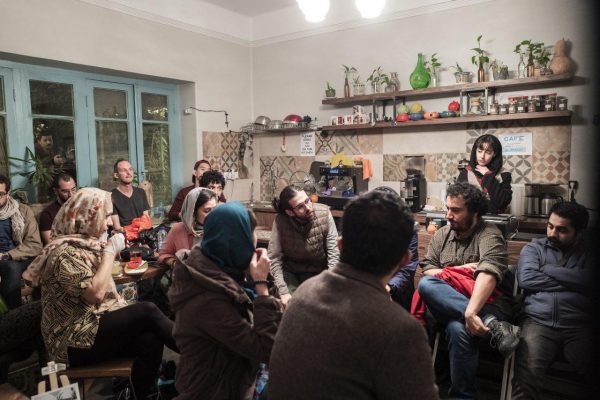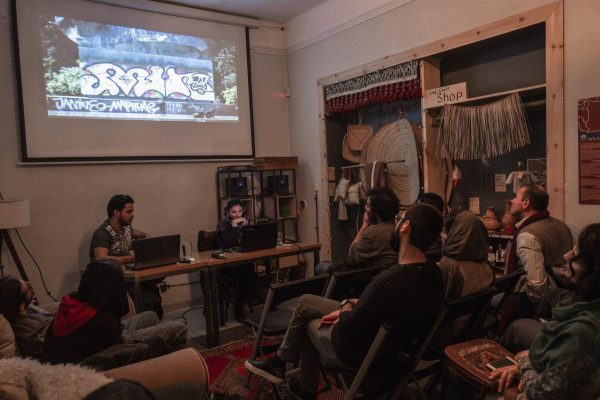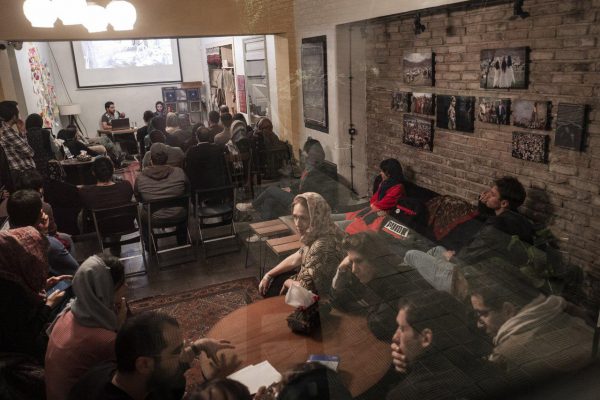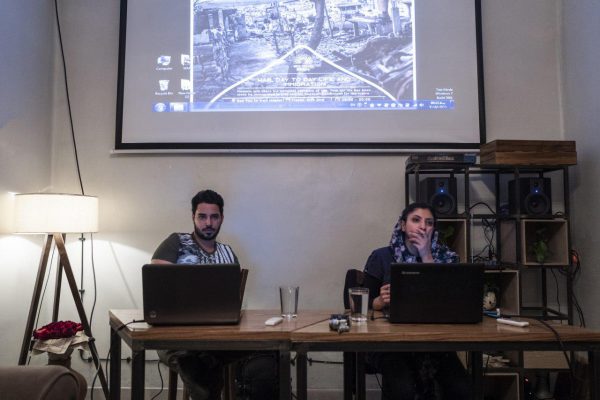The international day of war
How does war affect everyday life? In the time of war, people are forced to do what is undesirable and deviate from their path of life. The suffering of civilians is often neglected by the mainstream media since they serve other agendas. The most reliable source, capable of narrating the adversities that such conflicts bring about, is none other than people themselves. On November the 2nd, See You in Iran cultural house hosted Hossein, a 23 year old Syrian refugee who has been living in Iran for the past three years. He was 16 when the war in Syria broke out. Hossein shared his personal experiences, hopes and wishes and the hardships he has endured. Afterwards he answered participants’ questions regarding his life during the war in Syria and how he ended up immigrating to Iran. At the end of the event, our guests dined on a traditional Syrian meal and lingered in our hostel’s back yard where the conversations were carried on.
Hossein was born in Damascus. He despised school but enjoyed the company of his classmates. Ala and Ahmad were his closest friends. Ala wished to study philosophy and Ahmad wanted to major in English literature. They used to ditch school and go to Damascus different areas to explore the city. Hossein was 16 when the war started. He had gone to Damascus alongside his family for a wedding on the 18th of July, 2011 when the minister of defense and Bashar Al-Assad’s brother in law were killed in a car bombing. It was after this incident that chaos dominated the country. They left the wedding in a hurry to go back to their village by a mini-bus which was the only vehicle left in a deserted bus station. Along the way the car was stopped by a group of armed men who intended to search it. They scrammed when a helicopter approached the place. Hossein’s family and the rest of the population of their village were told by the government to register for guns and ammunition if they want to guard their area. He went to register at a National Defense Forces’ station and a guy named Fajr, approximately his own age, asked him to lend him his gun. When Hossein asked why, he replied, his family is stuck in a house in a village that is surrounded by Al-Nusra Front forces, an Al-Qaeda-linked jihadist group. They gathered eight other guys and head to the village. When they arrived at the house in front of which Fajr’s father’s car was burning, they realized there were 6 families including around 20 kids stuck in the place. They liberated the families and led them to the vehicle while Al-Nusra Front fighters were advancing. There weren’t enough seats in the car so Hossein and the rest of the guys who were armed had to walk back to the station. When they arrived at the station they had to briefly surrender their guns to be let in. During the war Hossein lost his classmates, Ahmad and Ala. Ahmad was killed in an explosion by a rocket. Ala was shot dead on his way to university. Despite all the trauma Hossein enrolled in university to study journalism. His favorite pass time back then was to watch movies with his friends at a café. It was then that he discovered his passion for cinema and decided to immigrate to Iran to study the art. He studied while resting from his shifts guarding the village. After passing the university entry exam he flew to Ghazvin to study Farsi and after 6 months came to Tehran to begin his course.
The second part of the event was dedicated to a Q&A with Hossein. The first few questions revolved around the reasons why the war started. The main consequential point according to Hossein was the lack of education. Syria consists of a variety of ethnicities and religious minorities which, in Hossein’s words, are not familiar with each other. The scarcity of mutual understanding might not have directly played a part in the initiation of the conflict but it certainly has a major role in its prolongation. About the everyday life during war Hossein stated that people have adopted to it to a great extent. He talked about how people, when hearing a rocket approaching, can guess where it’s coming from and estimate where it will hit. Once he was at a wedding and a rocket hits a target close by. People rushed to the ruins of building and curiously asked about the damages and casualties but went back to the party a few minutes later. When asked about his motivation to carry on with life in such environment, he mentioned being optimistic about the future and remaining hopeful. During the event he showcased two short films about two professional dancers. One was a Palestinian guy whose village was once surrounded by the ISIS forces. He pushed through the hardships with endurance and ended up opening a dance academy for immigrants’ children. The other one emigrated from Syria to Lebonan where he suffered severe depression and unfortunately committed suicide after recording his last dance. Hossein feels obligated as a Syrian film maker to move in the direction of showing the beauties and positives about Syria that are becoming more difficult to get grasp on amongst all the negative images that are broadcasted from within his country. He hopes in the future people of Syria become more united so they can decide the faith of their country without foreign interference.
See You in Iran cultural house, as a part of it’s immigration event series, is gratified to have provided a chance for a personal narrative as such to be heard so the situation becomes more comprehendible.
روایت مستند یک شهروند سوری از جنگ
جنگ چگونه بر زندگی روزمره انسان تاثیر میگذارد؟ جنگ، فضای خود را به انسان تحمیل میکند و او را از مسیر زندگی به بیراهه میکشاند. در این میان رسانههای غالب که در خدمت اهداف کلان دولتها میباشند، نسبت به رنج مردم بیتوجه هستند. تنها منبع قابل استناد برای روایت سختیها و ناخوشایندیهایی که جنگ به مردم تحمیل میکند، خود آنها میباشند. در روز جمعه، ۱۱ آبان، خانه فرهنگی See You in Iran میزبان حسین، مهاجر جوان سوریهای بود تا برایمان از جنگ، زندگی روزمره و مهاجرت بگوید. در بخش اول این رخداد حسین تجربیات شخصی خود را با حاضرین در میان گذاشت و از اهداف و آرزوهای خود برای آینده صحبت کرد. در قسمت دوم، او به سوالات شرکتکنندگان پاسخ گفت. در پایان رخداد از شرکتکنندگان با غذای سوری پذیرایی شد و گفتگوها در مورد مباحث مطرح شده در حیاط هاستل See You in Iran ادامه پیدا کرد.
آغاز هرج و مرج و حفظ امید
حسین شانزده ساله بود که به همراه خانوادهاش برای مهمانی نامزدی به شهر دمشق رفته بودند. در آن روز با کشته شدن وزیر دفاع و داماد بشار اسد در یک بمبگذاری درگیریها و هرج و مرج در سوریه شدت گرفت. حسین به همراه خانوادهاش با یک مینیبوس به سمت خانه درحرکت بودند که در راه توسط افرادی مسلح متوقف شدند. این افراد قصد بازرسی ماشین را داشتند اما با شنیدن صدای هلکوپتری که در حال نزدیک شدن به آن محل بود متواری شدند. حسین صدای تیراندازی، آژیر ماشینها و سطلهای شعلهور را از آن روز کاملا واضح به خاطر میآورد. اندکی بعد دولت به ساکنین روستای حسین و روستاهای اطراف اعلام کرد که برای دفاع از منطقه خود ثبت نام کرده و اسلحه تحویل بگیرند. حسین برای ثبت نام کردن به یکی از مقرهای سازمان دفاع ملی مراجعه میکند. در آنجا پسری به اسم فجر، از حسین برای آزاد کردن خانوادهاش از محاصره گروه جبهة النصره درخواست کمک میکند. آن دو به همراه شش نفر دیگر در ماشین سواری کوچکی به سمت محل محاصره شده حرکت میکنند. پس از رسیدن به آنجا متوجه میشوند که ۶ خانواده در آن خانه مخفی شدهاند. آنها موفق میشوند به سلامت تمامی سکنه را به ماشین که اندکی دورتر پارک شده بود برسانند وخودشان به ناچار پیاده برگشتند. حسین دوستان بچگی خود را در طول جنگ از دست داده است. اما با وجود تمام شرایط حسین در دانشگاه دمشق ثبت نام میکند و در رشته خبرنگاری مشغول به تحصیل میشود. تفریح مورد علاقهاش در آن زمان دیدن فیلم در کنار دوستان دانشگاهش در کافه بود. حسین از همین طریق متوجه علاقه خود به سینما میشود و تصمیم میگیرد که برای تحصیل در این رشته به ایران مهاجرت کند. در هنگام نگهبانی از روستای خود، حسین وقتهای استراحتش را به درس خواندن برای قبولی در کنکور اختصاص میداد. بعد از قبولی به قزوین میرود و قبل از آمدن به تهران ۶ ماه صرف یادگیری زبان فارسی میکند.
واکاوی زندگی روزمره در جنگ
در بخش دوم رخداد، حسین به سوالات شرکتکنندگان پاسخ داد. اوعلت اصلی تداوم درگیریها را در سوریه، فقدان آموزش مناسب شهروندان این کشور میداند. بافت جمعیتی سوریه متشکل از اقلیتهای قومی و دینی متنوعی است. عدم شناخت کافی این اقلیتها از یکدیگر موجب ادامه درگیریها است. از نظر حسین اختلافاتی که بین این اقلیتها به واسطه فقدان آموزش بوجود آمده، پیدا کردن راه حلی برای اتمام جنگ را به موضوعی بسیار چالش برانگیز تبدیل کرده است.
در مورد زندگی روزمره مردم درهنگام جنگ حسین از تجربه شخصی خود مثال میآورد . او از مراسم عروسی میگوید که در حین آن موشکی به مکانی نزدیک به آن اصابت میکند. مهمانان با عجله خود را به محل اصابت موشک میرسانند، در مورد خسارات جانی و مالی میپرسند و به مهمانیشان بازمیگردند. او میگوید پس از گذشتن چند سال از آغاز جنگ مردم با شنیدن صدای موشک میتوانند حدس بزنند که از کدام طرف شلیک شده و به کجا اصابت خواهد کرد. یکی از شرکتکنندگان درمورد انگیزه حسین برای ادامه تحصیل در زمان جنگ پرسید. او امید به آینده را مهمترین انگیزهاش در تحمل سختیهای جنگ میداند. حسین برای نشان دادن اهمیت این موضوع، در طول رخداد دو فیلم کوتاه درباره دو هنرمند سوری پخش کرد. یکی از آنها رقصندهای از مهاجران فلسطینی بود که در مقطعی از جنگ شهرشان به محاصره نیروهای حکومت اسلامی درآمد. او با پشت سرگذاشتن مصائب مختلف در نهایت توانست آموزشگاه رقصی برای کودکان پناهجو تأسیس کند. هنرمند دیگر اما رقصندهای سوری بود که به لبنان مهاجرت کرد. او به افسردگی حاد دچار شد و پس از فیلبرداری از آخرین رقصش متأسفانه دست به خودکشی زد.
حسین به عنوان یک فیلمساز سوری خود را متعهد به بازگویی نکات مثبت در مورد سوریه میداند. او در تلاش است تا تصویری متفاوت نسبت به آنچه که از سوریه در رسانههای غالب بازتاب مییابد ارائه دهد. او امیدوار است که در آیندهای نزدیک مردم سوریه با بهدست آوردن شناخت بهتری از یکدیگر سرنوشت خود را در دست گیرند و به دخالت دولتهای خارجی در این کشور پایان بخشند.
رخداد روز جنگ بخشی از سری رخدادها با موضوعیت مهاجرت در خانه فرهنگی See You in Iran بود که در آن به روایت شخصی حسین از جنگ، زندگی و آیندهاش پرداختیم. خوشحالیم که توانستیم فضایی فراهم کنیم تا در کنار هم به درکی ملموستر از جنگ و تأثیر مخرب آن بر زندگی روزمره افراد دست پیدا کنیم. امیدواریم در ادامه سری رخدادهای مهاجرت در کنار ما باشید.
What to Expect
Hossein is a 23-year-old cinema student from Syria who has been living in Iran for 3 years now. He was 16 when the war in Syria broke out. Hossein was an ambitious student of journalism back then and a member of his university’s scientific committee. His family was told by the government to sign up for a gun and guard their own village. In spite of the dread surrounding his life, he kept his hopes up and continued to study to be accepted in a university in Iran while standing guard. On November the 2nd, at 6:00 PM, See You in Iran hostel is hosting Hossein to hear his personal narrative of war, how his life has been since he immigrated to Iran and his hopes and ambitions for the future. We invite anyone who has had a war/conflict related experience or is interested to form a conversation about such phenomenon, to our cultural house on Friday, November the 2nd.
Photo by: Yasin Akgul/AFP/Getty Images
Itinerary:
18:00 – 19:00: Personal Narratives of War by Hossein
19:00 – 20:00: Q & A
